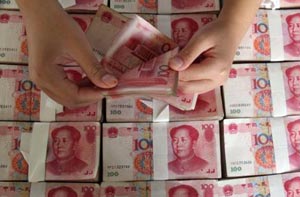
|
About 51.3 percent of the companies surveyed had put extra money into the underground banking system to make a profit, said a survey released on Thursday. Yang Dengfeng / for China Daily |
SHANGHAI - More than 65 percent of entrepreneurs at companies with annual sales of at least 30 million yuan ($4.72 million) believe that the credit crisis in Wenzhou was inevitable, given the little-supervised private lending system, according to a survey released on Thursday.
Severe financial problems experienced by companies in Wenzhou "could be seen as a process of economic development, which could happen anywhere when businesses must rely on high-interest loans, either to finance normal production or for more profit," said Nan Bo, the founder of the China Oriental Culture Broadcast Institute, which carried out the survey of 1,207 businesses during September and October.
Among the interviewees, 42.7 percent admitted that they had used private lenders, including 55.6 percent of respondents from Zhejiang province.
A further, 51.3 percent of the companies surveyed had put extra money into the underground banking system to make a profit.
"A majority of those entrepreneurs participated in the underground banking system because tight loan conditions left them no choice.
"What they actually need is to be able to make money from their businesses and obtain regular loans", said Nan.
A majority of the enterprise owners said they believed that the situation would be eased with the help and attention of the central government.
"I think the government took immediate action to avoid the collapse of the underground banking system in Wenzhou, which is a relief to all (small companies) in other regions," said Qiu Zhiming, the president of Ningbo Beifa Group Co Ltd.
The quarterly China SME Confidence Index, jointly issued by Standard Chartered Bank China and CBN Research on Thursday, showed that small and mid-sized enterprises in China were generally pessimistic about domestic economic conditions, following widespread failures among companies in Zhejiang province.
The index covers more than 1,400 SMEs in 16 cities across the country. It has four categories: the macroeconomy, business operations, investment and financing confidence. The index ranges from 0 to 100, with 50 considered as neutral.
The SME confidence level in eastern areas of China was the weakest, coming in at a mere 44.28 - far below the national level.
"In this quarter, SMEs in China had relatively weak confidence in the domestic macroeconomy, and they are divided in their views about the trend of credit policies in the coming quarter," said Li Wei, an economist at Standard Chartered Bank PLC.
"Most SMEs in East China are export-oriented, and they are heavily influenced by the economic situation and related policies in the US and European countries," Li said.
China Daily
(China Daily 10/14/2011 page14)
 A workshop of Sany Heavy Industry Co in Changsha
A workshop of Sany Heavy Industry Co in Changsha
 A Dongfeng Nissan car at the Guangzhou Auto Show 2012
A Dongfeng Nissan car at the Guangzhou Auto Show 2012
 Rural grid upgrades to ensure electricity
Rural grid upgrades to ensure electricity
 Xiamen Airlines joins SkyTeam
Xiamen Airlines joins SkyTeam
 Divorce pushes female tycoon from top spot
Divorce pushes female tycoon from top spot
 New career, new dream
New career, new dream
 Hengyuanxiang becomes official partner of COC
Hengyuanxiang becomes official partner of COC
 A more global yuan
A more global yuan